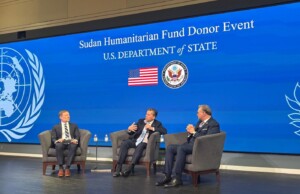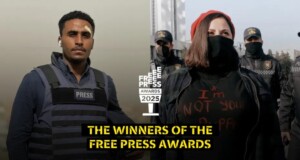Sudan’s press freedom worst for third year running
Sudan’s press freedom is gradually deteriorating, according to its new ranking in the World Press Freedom index of 2013. It is for the third year in a row one of the world’s worst countries to work in as a journalist. Sudan ranked 172th out of the 180 listed countries in the new Press Freedom Index 2014 by Reporters Without Borders, published on Wednesday. The country occupied number 170 last time, however Belize has been added to the index list, which means Sudan moved one place up – to its disadvantage. The past year has witnessed major declines in media freedom in the United States, Central African Republic and Guatemala and, on the other hand, has seen improvements in Ecuador, Bolivia and South Africa. “The index is a reference tool based on seven criteria: the level of abuses against journalists, the extent of pluralism in the media, media independence, the environment and self-censorship, the legislative framework, transparency and infrastructure”, Reporters Without Borders secretary-general Christophe Deloire explained in a press release.Sudan Sudan has barely scored on these criteria, in particular during the wave of protests against President Omar Al Bashir’s government and the withdrawal of subsidies for oil in Khartoum in September 2013. “The government disconnected the internet, seized newspapers such as El Intibaha, harassed journalists”, Reporters Without Borders said late September. “The National Intelligence and Security Services (NISS) suppressed the media coverage.” The downward trend in Sudan’s press freedom has continued in 2014. On 22 January, the NISS confiscated all copies of El Jareeda newspaper in Khartoum. The print runs of El Ayam, Alwan, and El Sahafa newspapers were confiscated in Khartoum last week. The purpose of confiscating after printing is to exhaust the newspapers financially. “It is, in fact, a direct and methodical liquidation, meant to kill the independent press”, the editor-in-chief of El Jareeda stated in October 2013. 10,000 copies of the paper were confiscated for the sixth time in the aftermath of demonstrations in Khartoum.Bashir addresses freedom Faroug Mohamed Ibrahim, head of the Organisation for the Defence of Rights and Freedoms, told Radio Dabanga last week that the blocking of press freedom confirms that the government “is insincere in its desire to engage in dialogue with all political forces”. He aimed at Al Bashir’s national speech on 27 January, in which he addressed public freedoms and asked all parties to lay down their arms and engage in dialogue. The heads of the National Consensus Forces, which include main opposition parties in Sudan, decided on Sunday that they will only enter dialogue with the regime if, among others, all laws restricting freedoms such as press freedoms are abolished.File photo: A Sudanese newspaper. Related: Sudanese opposition deny reports of ‘confidential dialogue’ (11 February 2014) Print runs of three Sudanese newspapers confiscated (4 February 2014) Mass arrests, newspaper confiscations continue in Sudan (6 October 2013) World Press Freedom Day: ‘Journalists facing terrible abuses’ in Sudan (3 May 2013)
Sudan’s press freedom is gradually deteriorating, according to its new ranking in the World Press Freedom index of 2013. It is for the third year in a row one of the world’s worst countries to work in as a journalist.
Sudan ranked 172th out of the 180 listed countries in the new Press Freedom Index 2014 by Reporters Without Borders, published on Wednesday. The country occupied number 170 last time, however Belize has been added to the index list, which means Sudan moved one place up – to its disadvantage.
The past year has witnessed major declines in media freedom in the United States, Central African Republic and Guatemala and, on the other hand, has seen improvements in Ecuador, Bolivia and South Africa.
“The index is a reference tool based on seven criteria: the level of abuses against journalists, the extent of pluralism in the media, media independence, the environment and self-censorship, the legislative framework, transparency and infrastructure”, Reporters Without Borders secretary-general Christophe Deloire explained in a press release.
Sudan
Sudan has barely scored on these criteria, in particular during the wave of protests against President Omar Al Bashir’s government and the withdrawal of subsidies for oil in Khartoum in September 2013. “The government disconnected the internet, seized newspapers such as El Intibaha, harassed journalists”, Reporters Without Borders said late September. “The National Intelligence and Security Services (NISS) suppressed the media coverage.”
The downward trend in Sudan’s press freedom has continued in 2014. On 22 January, the NISS confiscated all copies of El Jareeda newspaper in Khartoum. The print runs of El Ayam, Alwan, and El Sahafa newspapers were confiscated in Khartoum last week.
The purpose of confiscating after printing is to exhaust the newspapers financially. “It is, in fact, a direct and methodical liquidation, meant to kill the independent press”, the editor-in-chief of El Jareeda stated in October 2013. 10,000 copies of the paper were confiscated for the sixth time in the aftermath of demonstrations in Khartoum.
Bashir addresses freedom
Faroug Mohamed Ibrahim, head of the Organisation for the Defence of Rights and Freedoms, told Radio Dabanga last week that the blocking of press freedom confirms that the government “is insincere in its desire to engage in dialogue with all political forces”. He aimed at Al Bashir’s national speech on 27 January, in which he addressed public freedoms and asked all parties to lay down their arms and engage in dialogue.
The heads of the National Consensus Forces, which include main opposition parties in Sudan, decided on Sunday that they will only enter dialogue with the regime if, among others, all laws restricting freedoms such as press freedoms are abolished.
File photo: A Sudanese newspaper.
Related:
Sudanese opposition deny reports of ‘confidential dialogue’ (11 February 2014)
Print runs of three Sudanese newspapers confiscated (4 February 2014)
Mass arrests, newspaper confiscations continue in Sudan (6 October 2013)
World Press Freedom Day: ‘Journalists facing terrible abuses’ in Sudan (3 May 2013)











 and then
and then